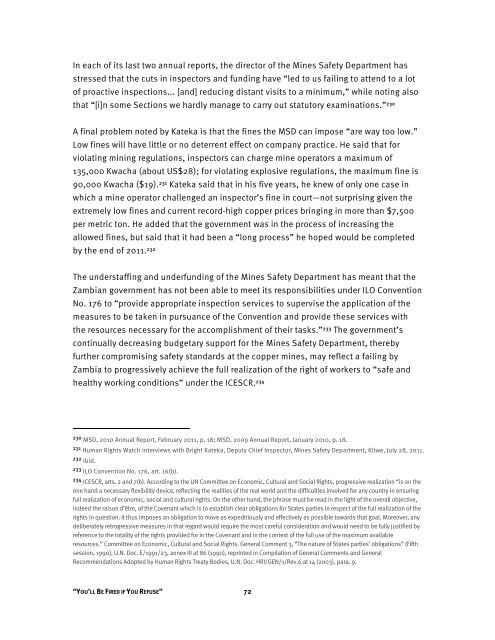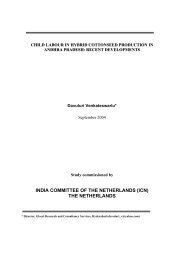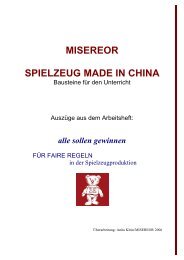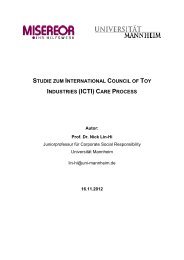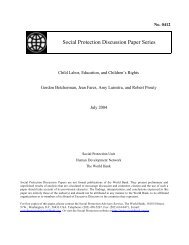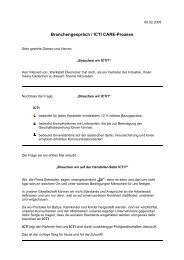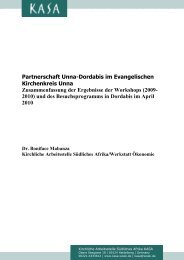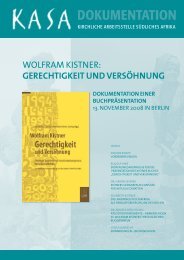“You'll Be Fired if You Refuse†- Human Rights Watch
“You'll Be Fired if You Refuse†- Human Rights Watch
“You'll Be Fired if You Refuse†- Human Rights Watch
You also want an ePaper? Increase the reach of your titles
YUMPU automatically turns print PDFs into web optimized ePapers that Google loves.
In each of its last two annual reports, the director of the Mines Safety Department has<br />
stressed that the cuts in inspectors and funding have “led to us failing to attend to a lot<br />
of proactive inspections... [and] reducing distant visits to a minimum,” while noting also<br />
that “[i]n some Sections we hardly manage to carry out statutory examinations.” 230<br />
A final problem noted by Kateka is that the fines the MSD can impose “are way too low.”<br />
Low fines will have little or no deterrent effect on company practice. He said that for<br />
violating mining regulations, inspectors can charge mine operators a maximum of<br />
135,000 Kwacha (about US$28); for violating explosive regulations, the maximum fine is<br />
90,000 Kwacha ($19). 231 Kateka said that in his five years, he knew of only one case in<br />
which a mine operator challenged an inspector’s fine in court—not surprising given the<br />
extremely low fines and current record-high copper prices bringing in more than $7,500<br />
per metric ton. He added that the government was in the process of increasing the<br />
allowed fines, but said that it had been a “long process” he hoped would be completed<br />
by the end of 2011. 232<br />
The understaffing and underfunding of the Mines Safety Department has meant that the<br />
Zambian government has not been able to meet its responsibilities under ILO Convention<br />
No. 176 to “provide appropriate inspection services to supervise the application of the<br />
measures to be taken in pursuance of the Convention and provide these services with<br />
the resources necessary for the accomplishment of their tasks.” 233 The government’s<br />
continually decreasing budgetary support for the Mines Safety Department, thereby<br />
further compromising safety standards at the copper mines, may reflect a failing by<br />
Zambia to progressively achieve the full realization of the right of workers to “safe and<br />
healthy working conditions” under the ICESCR. 234<br />
230 MSD, 2010 Annual Report, February 2011, p. 18; MSD, 2009 Annual Report, January 2010, p. 18.<br />
231 <strong>Human</strong> <strong>Rights</strong> <strong>Watch</strong> interviews with Bright Kateka, Deputy Chief Inspector, Mines Safety Department, Kitwe, July 28, 2011.<br />
232 Ibid.<br />
233 ILO Convention No. 176, art. 16(b).<br />
234 ICESCR, arts. 2 and 7(b). According to the UN Committee on Economic, Cultural and Social <strong>Rights</strong>, progressive realization “is on the<br />
one hand a necessary flexibility device, reflecting the realities of the real world and the d<strong>if</strong>ficulties involved for any country in ensuring<br />
full realization of economic, social and cultural rights. On the other hand, the phrase must be read in the light of the overall objective,<br />
indeed the raison d’être, of the Covenant which is to establish clear obligations for States parties in respect of the full realization of the<br />
rights in question. It thus imposes an obligation to move as expeditiously and effectively as possible towards that goal. Moreover, any<br />
deliberately retrogressive measures in that regard would require the most careful consideration and would need to be fully just<strong>if</strong>ied by<br />
reference to the totality of the rights provided for in the Covenant and in the context of the full use of the maximum available<br />
resources.” Committee on Economic, Cultural and Social <strong>Rights</strong>. General Comment 3, “The nature of States parties’ obligations” (F<strong>if</strong>th<br />
session, 1990), U.N. Doc. E/1991/23, annex III at 86 (1990), reprinted in Compilation of General Comments and General<br />
Recommendations Adopted by <strong>Human</strong> <strong>Rights</strong> Treaty Bodies, U.N. Doc. HRI/GEN/1/Rev.6 at 14 (2003), para. 9.<br />
“YOU’LL BE FIRED IF YOU REFUSE” 72


